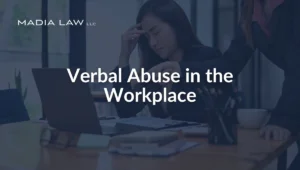
Verbal abuse at work often leads to lasting emotional trauma, damaged reputations, and career setbacks. At Madia Law, we’ve defended dozens of employees across Minnesota who faced hostile work environments that subjected them to intimidation, humiliation, and emotional distress. Whether the trauma endured was in the form of persistent shouting, gaslighting, or insults disguised as “tough management,” this negative behavior has no place in the modern workplace.
Still, many workers who experience these conditions choose to remain silent, unsure if what they are experiencing is illegal or simply afraid to take action. If you find yourself in this situation, know that you are not alone. You have rights and helpful resources you can turn to for support. And there are clear legal steps you can take to protect your well-being and your future.
Speak with our experienced Minneapolis / St. Paul employment lawyers today to understand the full range of your legal options to counter verbal abuse at work.
What Is Considered Verbal Abuse at Work
Verbal abuse in the workplace refers to repeated or severe use of language that intimidates, belittles, or humiliates an employee. It may come from a manager, a coworker, or a group of peers. While verbal abuse is a behavioral pattern, verbal harassment becomes a legal issue when it targets a protected characteristic under the law, such as race, sex, age, religion, disability, or national origin.
Under the Minnesota Human Rights Act (MHRA) [Minn. Stat. § 363A.08], it is illegal for employers to permit or ignore verbal conduct that creates a hostile work environment based on a protected trait. At Madia Law, we have capably represented workers dealing with daily insults, threats, or gaslighting. When this behavior becomes repetitive and harmful, it violates both state and federal employment discrimination laws.
For a legal consultation, call 612-349-2729
What To Do If You Experience Verbal Abuse at Work & How To Take Legal Action
You have the right to protect yourself if you are being verbally abused at work. This is not an easy task, especially when the person responsible for the abuse is in a position of more power, but there is a clear process you can follow.
At Madia Law, we talk to employees every week who are deciding whether to report verbal abuse, stay silent, or leave their jobs entirely. You do not have to make that decision on your own and without additional background information. Here are five steps to take when verbal abuse becomes part of your work environment.
Step 1: Recognize the Patterns of Workplace Verbal Abuse
First, identify the pattern. Verbal abuse rarely begins with yelling. It often starts with subtle jabs, sarcastic comments, or personal criticisms masked as feedback. Sometimes, it takes the form of backhanded comments or passive-aggressive feedback. These moments may seem isolated, but they often repeat and grow in hostility over time.
That repetition is what matters. Verbal abuse becomes clear when those early sporadic engagements escalate into regularly occurring behavior, gaslighting in meetings, public embarrassment, or blame without justification. At Madia Law, we have witnessed how employees who identify these patterns early are able to take more meaningful action.
Step 2: Document the Abuse
Once you recognize the abuse, the next step is to start writing it down. Documentation gives you proof, and proof gives you power through validation. Without it, it becomes your word against theirs, which makes it harder to take legal action.
Keep a simple record. Write down what was said, when it happened, where it happened, and who was there. Save emails, texts, chat messages, and voicemails if someone mentions the incident. It helps show that others noticed the behavior.
Stay consistent and update your notes every time something happens. Over time, your record will show a clear pattern, and that’s exactly what matters if you decide to report or take legal action.
Step 3: Report the Incident to HR or Management
After documenting what happened, report the abuse through your company’s internal process. This creates an official record and gives your employer a chance to fix the problem. If they ignore it, you will have done your part, which matters later.
Be clear, calm, and specific. Describe what was said, when it happened, how it affected you, and whether anyone else witnessed it. Submit the report in writing if possible, and keep a copy for yourself. Follow up and ask for an update if the abuse continues. We have represented several clients who turned their cases around simply because they followed this step and kept the right records.
Step 4: File a Formal Complaint
The next step is to file a formal complaint if reporting the abuse to HR does not lead to change. File a charge with the Equal Employment Opportunity Commission (EEOC) or the Minnesota Department of Human Rights (MDHR). Include a clear timeline of events, witness names, and all documentation you collected.
Then, wait for the agency to review your claim. They often investigate or issue a “right to sue” letter, which allows you to take your case to court. At Madia Law, we have helped many employees work their way through this important process step. When your employer refuses to act, the law offers a way forward.
Step 5: Seek Legal Advice
Speak with an employment lawyer when your company fails to stop the abuse or take your concerns seriously. We can tell you where you stand, what your rights are, and what actions you can take to protect yourself. You do not have to wait for things to escalate to ask for help.
At Madia Law, we guide employees across Minnesota through workplace harassment, retaliation, and hostile work environments. Whether the abuse is ongoing or has already forced you out, our legal advice can help you make informed decisions and take back control of your future.
What Laws Protect You From Workplace Verbal Harassment?
There are four key laws that protect employees from verbal harassment in the workplace, especially when the abuse targets a protected trait like race, gender, religion, disability, or age.
- The Minnesota Human Rights Act [Minn. Stat. § 363A.08] prohibits verbal conduct that targets protected traits and creates a hostile work environment.
- Title VII of the Civil Rights Act of 1964 (42 U.S.C. § 2000e) bars harassment based on race, color, religion, sex, or national origin.
- The Americans with Disabilities Act (ADA) protects against disability-based harassment.
- The Age Discrimination in Employment Act (ADEA) protects employees age 40 and older.
At Madia Law, our employment lawyers use these protections daily to hold employers accountable and help employees regain their dignity, safety, and career progress.
When Can You Sue for Verbal Abuse at Work?
You can sue for verbal abuse when the behavior creates a hostile work environment or violates your rights under discrimination laws. Not every unkind comment qualifies, but ongoing or targeted abuse often does.
To determine whether a lawsuit is possible, courts look at several key factors:
- First, the pattern of behavior: Was it recurring and sustained over time?
- Second, the severity: Did it disrupt your ability to do your job or cause emotional harm?
- Third, your employer’s response: Did they investigate, take action, or ignore it?
What matters most is the pattern and the proof. We have built strong cases using clear documentation, witness names, written notes, and formal HR complaints. When you have formally reported the abuse and nothing has changed, it is time to explore your legal options.
At Madia Law, we help Minnesota employees understand their rights and take action when verbal abuse turns into legal wrongdoing.
Click to contact our personal injury lawyers today
What Are Employers’ Responsibilities in Preventing Verbal Abuse?
Employers are responsible for creating a workplace environment with zero tolerance for verbal abuse. That means more than waiting for complaints; it means building a proactive culture, i.e., one where abuse is discouraged and prevented before it starts.
This includes setting clear expectations, training leadership, and responding quickly when concerns are raised. When companies ignore early warning signs, they often allow small problems to grow into legal ones. We have seen this pattern in so many cases that we have handled for Madia Law clients.
How Employers Are Legally Obligated to Prevent Workplace Harassment
Under Minnesota law (Minn. Stat. § 363A.28) and federal guidelines, employers can be held liable under state and federal law when they fail to stop verbal harassment tied to a protected trait. They have a duty to act when harassment is reported or when they witness it themselves.
This legal obligation begins the moment a manager observes abusive behavior or receives a complaint. The company is often found negligent if it fails to investigate, take corrective action, or follow policy. In Minnesota, courts evaluate whether the employer knew, how quickly they responded, and what steps they took. Ignoring verbal harassment is not just poor management; it is a bona fide legal risk.
What Should a Proper Anti-Harassment Policy Include?
A strong workplace policy should:
- Define harassment, including verbal abuse
- Explain how to report it step-by-step
- Identify who handles complaints and what employees can expect
- Ban retaliation against anyone who reports
- Describe disciplinary actions for violations
At Madia Law, we have witnessed workplace policies fail their employees because they were too vague or simply ignored. A clear process, along with emphasis on following that process, helps prevent abuse and protects everyone.
Complete a Case Evaluation form now
Knowing Your Rights vs Acting on Them
Knowing you are protected by Minnesota law is important, but taking action is what changes your outcome. Many employees stay silent, not because they do not understand the law, but because they fear what might happen next.
We have had conversations with potential clients who were worried about losing their jobs, damaging their reputations, or being labeled difficult. That fear is real, but so is the cost of staying quiet. Verbal abuse does not stop happening on its own, and hoping it gets better rarely works. At Madia Law, we help employees bridge the gap between understanding their rights and utilizing those rights to protect their future.
Examples of Verbal Abuse That Could Lead to a Lawsuit
Not every rude comment breaks the law, but some patterns of verbal abuse clearly cross the legal line. These examples show when abusive behavior becomes serious enough to support a workplace harassment claim.
- Repeated racial or sexual slurs directed at an employee in meetings or conversations
- Public humiliation, such as yelling at someone in front of others or calling them offensive names
- Verbal threats tied to job security, especially when connected to race, gender, age, or disability
- Mocking or impersonating someone’s accent, speech, or disability
- Using abusive language in retaliation after someone reports misconduct
- Gaslighting, where a supervisor denies past abuse or manipulates facts to make the employee question their memory
- Ongoing personal attacks that isolate or intimidate someone based on their identity
How Much Can You Sue for Verbal Abuse?
The amount you can recover in a verbal abuse lawsuit depends on how the abuse affected your life, your health, and your career. There is no fixed number, but the stronger your evidence, the clearer your claim and the greater its probability of succeeding.
Courts typically award three types of damages:
- Emotional distress, including anxiety, depression, or mental health treatment
- Lost wages or missed promotions, if the abuse affected your job or forced you to leave
- Punitive damages, in rare cases, are awarded when an employer’s actions were especially reckless or intentional
At Madia Law, we have worked case outcomes that range from thousands to hundreds of thousands of dollars depending on the severity of the abuse, the employer’s response, and the long-term impact on the employee. No two cases are the same, but real and quantifiable harm merits real compensation.
Can You Sue Your Boss for Talking Behind Your Back?
Yes, you can sue your boss for talking behind your back, but only when the comment is false, damaging, and tied to a protected trait like race, gender, disability, or age. Not every workplace comment creates legal risk, but some cross into harassment or defamation.
The false claim often qualifies as unlawful if your boss spreads it to hurt your reputation or targets your identity. But casual opinions or office gossip, even if inappropriate, usually do not rise to the legal standard of abuse. At Madia Law, we help employees understand where that line is and what action to take when it is crossed.
Schedule a Consultation with a Minneapolis Employment Lawyer
Verbal abuse at work is unlawful when it creates a hostile environment or targets a protected trait. Speaking with our employment lawyers can help you understand your rights and decide what to do next.
At Madia Law, we have helped Minnesotans working in all industries stand up to hostile work environments, workplace harassment, and retaliation. We will carefully review your situation, answer all of your questions, and explain which legal paths make the most sense for your case. Your story matters, and your road to justice matters more, and we are here to help you take the next step with confidence.
Call us today or fill out this form to discuss your case with us!
Call 612-349-2729 or complete a Case Evaluation form



